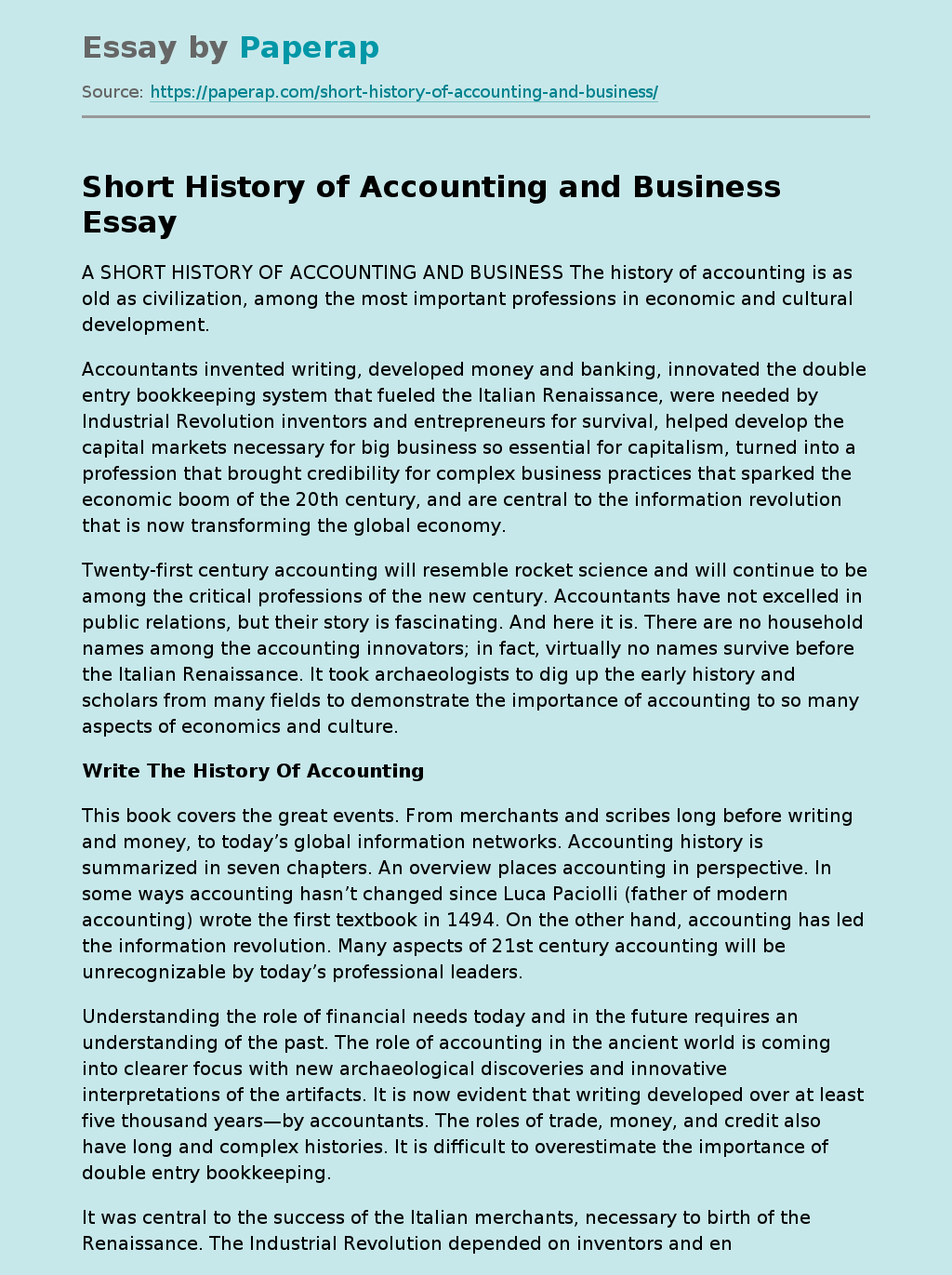Short History of Accounting and Business
The following sample essay on Short History of Accounting and Business it is the history of accounting old civilization, among the most important professions in economic and cultural development.
Accountants invented writing, developed money and banking, innovated the double entry bookkeeping system that fueled the Italian Renaissance, were needed by Industrial Revolution inventors and entrepreneurs for survival, helped develop the capital markets necessary for big business so essential for capitalism, turned into a profession that brought credibility for complex business practices that sparked the economic boom of the 20th century, and are central to the information revolution that is now transforming the global economy.
Twenty-first century accounting will resemble rocket science and will continue to be among the critical professions of the new century. Accountants have not excelled in public relations, but their story is fascinating. And here it is. There are no household names among the accounting innovators; in fact, virtually no names survive before the Italian Renaissance. It took archaeologists to dig up the early history and scholars from many fields to demonstrate the importance of accounting to so many aspects of economics and culture.
This book covers the great events. From merchants and scribes long before writing and money, to today’s global information networks. Accounting history is summarized in seven chapters. An overview places accounting in perspective. In some ways accounting hasn’t changed since Luca Paciolli (father of modern accounting) wrote the first textbook in 1494. On the other hand, accounting has led the information revolution. Many aspects of 21st century accounting will be unrecognizable by today’s professional leaders.
Understanding the role of financial needs today and in the future requires an understanding of the past. The role of accounting in the ancient world is coming into clearer focus with new archaeological discoveries and innovative interpretations of the artifacts. It is now evident that writing developed over at least five thousand years—by accountants. The roles of trade, money, and credit also have long and complex histories. It is difficult to overestimate the importance of double entry bookkeeping.
It was central to the success of the Italian merchants, necessary to birth of the Renaissance. The Industrial Revolution depended on inventors and entrepreneurs, not accountants. It is the survival of their firms that required innovative accounting and, later, the development of a profession. Big business, particularly the railroads, required capital markets that depended on accurate and useful information. This was supplied by the expanding accounting profession. The earliest of the Big Eight started in mid-nineteenth century London.
Turn of the century America saw the rise of really big business, governable because of improvement in cost accounting. But the Crash of 1929 and the subsequent Great Depression demonstrated problems with capital markets, business practices, and, yes, considerable deficiencies in accounting practices. Many aspects of current accounting practices started with the flood of business regulations from the Roosevelt administration. The earliest electronic computers were funded to assist the World War II efforts.
By 1950 massive efforts were begun to automate accounting practices, a continuing process. A global real-time integrated system is a near reality, suggesting new accounting paradigms replacing double entry and generally accepted accounting principles. Why read this book? What we do today in accounting is based on a 10,000-year history. Understanding this history is necessary to comprehending the linkages of accounting to career potential, financial regulation, tax, accounting systems, and management decision issues.
This history also is a powerful tool to predict the accounting of the next generation. The father and the first innovator of accountancy is Luca Pacioli (1445 – 1517), also known as Friar Luca dal Borgo, is credited for the “birth” of accounting. His Summa de arithmetica, geometrica, proportioni et proportionalita (Summa on arithmetic, geometry, proportions and proportionality, Venice 1494), was a textbook for use in the abbaco schools of northern Italy, where the sons of merchants and craftsmen were educated.
It was a compendium of the mathematical knowledge of his time, and includes the first printed description of the method of keeping accounts that Venetian merchants used at that time, known as the double-entry accounting system. Although Pacioli codified rather than invented this system, he is widely regarded as the “Father of Accounting”. The system he published included most of the accounting cycle as we know it today. He described the use of journals and ledgers, and warned that a person should not go to sleep at night until the debits equalled the credits!
His ledger had accounts for assets (including receivables and inventories), liabilities, capital, income, and expenses — the account categories that are reported on an organisation’s balance sheet and income statement, respectively. He demonstrated year-end closing entries and proposed that a trial balance be used to prove a balanced ledger. His treatise also touches on a wide range of related topics from accounting ethics to cost accounting.
Short History of Accounting and Business. (2019, Dec 05). Retrieved from https://paperap.com/short-history-of-accounting-and-business/

